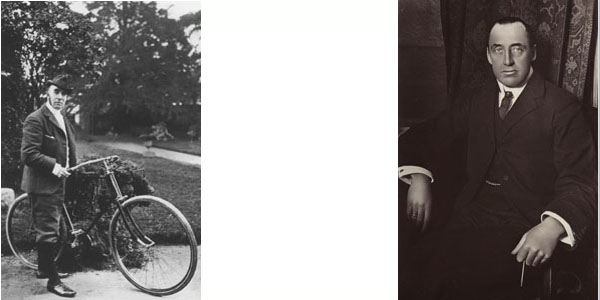
left: Lord Alfred Douglas’s father, John Sholto Douglas, 8th Marquess of Queensberry. © Merlin Holland
right: Edward Carson, lead counsel for the Marquess of Queensberry in the libel trial. © National Portrait Gallery, London.
Chapter 8: ‘Absurd and silly perjuries’ – The Dramatist in the Dock
Chapter 8 begins with an account of Wilde’s and Bosie’s movements between their departure from Worthing at the start of October 1894 and the Marquess of Queensberry’s leaving the ‘posing somdomite’ card at Wilde’s club in February 1895.
There is also a brief account of the Cleveland Street Scandal of 1889–90, the other most notorious homosexual scandal of the period, which cast a shadow over the Wilde trials.
The motives for Wilde deciding to sue Queensberry for libel are carefully examined, and a number of pages are devoted to the awkward but interesting question of Wilde’s attitude to the social class of the youths with whom he was involved, as revealed during the three trials.
It is made clear that, contrary to what is often supposed, Wilde’s trials were conducted with scrupulous fairness. He was no more a ‘victim’ of English justice than he was of Victorian hypocrisy.
The chapter ends with a melancholy catalogue of deaths, and summarises how Wilde has been seen in Worthing since his death.
The extract below comes from one-third of the way through Chapter 8. The original numbering is retained for the notes, which start at note 21.
An awkward area for Wilde’s reputation was was his attitude to social class as revealed during the trials – an attitude that provided Edward Carson with much ammunition during the libel trial. Wilde may, four years earlier, have written a long essay called ‘The Soul of Man under Socialism’, but it is difficult not to conclude that he was what would today be called a champagne socialist. Indeed, in his venomous account in Oscar Wilde and Myself, Bosie accuses Wilde of being a vulgar social climber, who was ‘too much the tuft-hunter and the snob ever to be liked by the people for whose acquaintance he sighed … He dearly loved a lord and would put up with a great deal of pain and inconvenience on the mere chance of a casual word or two with a duchess.’ ‘Wilde’s socialism,’ adds Bosie mystifyingly, ‘was a species of socialism which looks very revolutionary but which is really designed to benefit the rich rather than the poor.’[21]
While these comments were malicious – and, to be fair to Bosie, it should be noted that he later repudiated the book[22] – there is some truth in them. Wilde had an air of effortless superiority about him that could be confused with snobbishness, but – although some of his answers in court might suggest the contrary – he was not by nature patronising. It is, however, hardly surprising that he was uncomfortable when Carson repeatedly referred to the social difference between him and the young men whose company he enjoyed.
Wilde had no alternative but to claim, improbably, that he was a man entirely indifferent to all distinctions of class. Thus, questioned about his association with Alfred Wood, Wilde said: ‘If anybody interests me or is in trouble and I have been asked to help him in any way, what is the use of putting on airs about one’s own social position? It is childish.’[23] When Carson asked if he knew that Charles Parker had been a valet, Wilde replied: ‘I never heard it, nor should I have minded. I don’t care twopence about people’s social positions.’[24] And when, a little later, Carson again asked if he knew that one of the Parker brothers was a valet and the other a groom, Wilde said that he did not know, repeating: ‘Nor should I have cared … I don’t think twopence for social position; if I like them, I like them. It is a snobbish and vulgar thing to do.’[25] Finally, when Carson returned yet again to his theme, asking Wilde what he had in common with a young man of Charlie Parker’s class, Wilde replied:
Well, I will tell you, Mr Carson, I delight in the society of people much younger than myself. I like those who may be called idle and careless. I recognise no social distinctions at all of any kind and to me youth – the mere fact of youth – is so wonderful that I would sooner talk to a young man half an hour than even be, well, cross-examined in court. (Laughter.) [26]
Although Wilde largely maintained a consistent – if unconvincing – position as a man indifferent to class distinction, he dropped his guard when the opportunity for a witty riposte presented itself in the context of the clothes he had given Alphonse Conway. Carson suggested that he had bought Conway the clothes ‘in order that he might look more like an equal’. ‘Oh, no,’ Wilde replied, ‘he never would have looked that.’ (Laughter.) [27]
In addition, Wilde demonstrated again and again how conscious he was of the intellectual gap between himself and his young friends; and indeed he made humorous capital out of this, something just as ‘vulgar’ as making social distinctions. However he made an exception in the case of Alphonse Conway, for whom he clearly retained more affection than for any of the others.
Although his guard had slipped when it came to Alphonse’s new clothes, he was protective of him when it came to his lack of education:
CARSON: He was an uneducated lad, wasn’t he?
WILDE: Oh, he was a pleasant, nice creature. He was not cultivated. (Laughter.) Don’t sneer at that. He was a pleasant, nice creature.[28]
Admirable though it was that Wilde would not countenance Alphonse’s lack of cultivation being the cause of mirth, in the process he used a term that emphasised the social difference between them – he would not have called Robert Ross or Bosie a ‘creature’, nor, for that matter a youth with intellectual interests such as Edward Shelley.
Although Alphonse’s lack of education was off limits, Wilde rarely missed an opportunity for humorous comment at the expense of most of his other unintellectual companions. When Carson asked him whether Charles Parker was ‘an educated man’, Wilde replied, to laughter, ‘Culture was not his strong point.’[29]] And when, a little later, a letter from Parker was produced and read, and Carson asked if Wilde had any other of Parker’s letters, Wilde replied: ‘I never thought his correspondence sufficiently interesting to preserve.’[30]
Wilde responded in similar terms when Carson moved on to Fred Atkins and asked whether Atkins had discussed literature with him. There followed this exchange:
WILDE: Oh, I would not allow him. (Laughter.)
CARSON: That was not his line?
WILDE: No, the art of the music hall was as far as he had got. (Laughter.) [31]
Sometimes during the trials there were small, unguarded, foolish moments that revealed much. During the first criminal trial, for example, Charles Gill, the lead prosecutor, questioned Wilde about the cigarette cases that he gave as a matter of course to almost any youth that caught his eye; and Wilde remarked, more patronisingly than pertinently: ‘Boys of that class smoke a good deal of cigarettes’ – as though heavy smoking were vulgar behaviour confined to the lower classes, rather than a habit to which he himself was also addicted.[32]
A similarly patrician moment came during the second criminal trial, when Wilde was asked if he denied that there had been unusual stains on his bed-sheets at the Savoy Hotel during his stay there in March 1893: ‘I do not examine bed linen when I arise,’ he replied. ‘I am not a housemaid.’[33]
By the time of the second criminal trial Wilde was worn down and tired, and, although there were still flashes of brilliance, his tone was notably less assured than it had been during, in particular, much of the libel trial. Also he was no longer thinking so nimbly or defensively. This sequence during his cross-examination by Sir Frank Lockwood is telling:
WILDE: I admit that I am enormously fond of praise and admiration, and that I like to be made much of by my inferiors – inferiors socially. It pleases me very much.
LOCKWOOD: What pleasure could you find in the society of boys much beneath you in social position?
WILDE: I make no social distinction.
[This mantra now seems very tired and unconvincing, not least in that it immediately follows Wilde’s use of the word ‘inferiors’.]
LOCKWOOD: What did you do with them?
WILDE: I read to them. I read one of my plays to them.
[Improbable, surely?]
LOCKWOOD: Did it not strike you that in your position you could exercise a considerable influence over these lads for good or ill?
WILDE: No, I am bound to say I don’t think it did. The only influence I could exercise on anybody would be a literary influence. Of course in the case of these young men that would be out of the question. [In that case, what was the point of reading them his play?] Otherwise I don’t see what capacity I have for influencing people.[34]
In reality Wilde was posing when he made himself out to be a man without social distinctions. He did not seek out members of the lower classes unless they were young, male, and sexually amenable. What remains surprising, however, is the tone that he often took in court. It is as if he had forgotten where he was. His humorous comments were of the kind he might have made had he been among friends. At that time, and indeed through much of the twentieth century, liaisons between educated homosexuals and working-class boys or young men were common. When a man was among other members of his own tribe, light-hearted comments about the gaucheries and ignorance of the desirable youth were not unusual; and they caused no harm or hurt, since the young man was not present. It helped deflate the underlying embarrassment of the social and intellectual mismatch. But courtesy and common sense dictate that the ignorance and vulgarity of your bed-mates should not be mocked in public. Whom did Wilde think he was addressing? Bosie or Robbie Ross?
21. Douglas, Oscar Wilde and Myself, pp. 69-70 & p. 75.
22. On pp. 231-2 of Son of Oscar Wilde Vyvyan Holland prints a letter to him from Bosie that includes this: ‘It is true that I attacked him in my book, Oscar Wilde and Myself, but I did it under frightful provocation [namely what Wilde had written about Bosie in ‘De Profundis’], and I have now repudiated the book.’ On p. 171 of his book Holland says that this letter was written ‘in about 1929’. In September 1944 Bosie wrote on a blank page at the front of Donald Sinden’s copy of the book: ‘This book (nearly all of which was written by T. D. H. Crosland) has long since been repudiated by me. It does not represent my real views about Wilde as I have explained in numerous places. I much regret that it was ever published.’ I am grateful to Donald Mead for sending me a scan of this page.
23. Merlin Holland, Irish Peacock & Scarlet Marquess: The Real Trial of Oscar Wilde (Fourth Estate, 2003), p. 119.
24. Holland, Irish Peacock & Scarlett Marquess, p. 164.
25. Holland, Irish Peacock & Scarlett Marquess, p. 166.
26. Holland, Irish Peacock & Scarlett Marquess, pp. 174-5.
27. Holland, Irish Peacock & Scarlett Marquess, p. 149.
28. Holland, Irish Peacock & Scarlett Marquess, p. 145.
29. Holland, Irish Peacock & Scarlett Marquess, p. 165.
30. Holland, Irish Peacock & Scarlett Marquess, p. 178.
31. Holland, Irish Peacock & Scarlett Marquess, p. 185.
32. Hyde, Trials of Oscar Wilde, p. 241.
33. Hyde, Trials of Oscar Wilde, p. 321.
34. Hyde, Trials of Oscar Wilde, p. 316.

